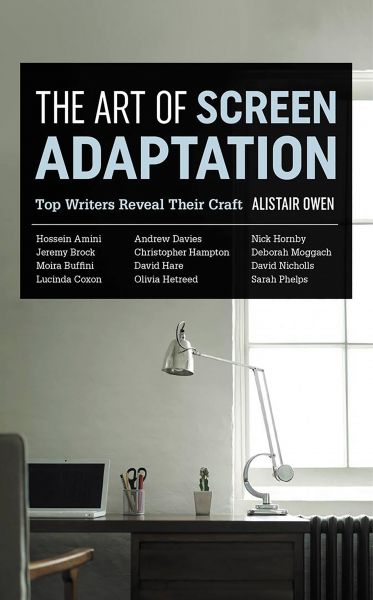The Art of Screen Adaptation
25% discount offer - use code CE25 at checkout
'If you decide to adapt a classic or much-loved book, your working maxim should be, 'How will it work best as a film?' However faithful it is to the original, if it's not interesting onscreen then you've failed.' - William Boyd in Story and Character: Interviews with British Screenwriters
Hollywood. Netflix. Amazon. BBC. Producers and audiences are hungrier than ever for stories, and a lot of those stories begin life as a book - but how exactly do you transfer a story from the page to the screen? Do adaptations use the same creative gears as original screenplays? Does a true story give a project more weight than a fictional one? Is it helpful to have the original author's input on the script? And how much pressure is the screenwriter under, knowing they won't be able to please everyone with the finished product?
Alistair Owen puts all these questions and many more to some of the top names in screenwriting, including Hossein Amini (Drive), Jeremy Brock (The Last King of Scotland), Moira Buffini (Jane Eyre), Lucinda Coxon (The Danish Girl), Andrew Davies (War & Peace), Christopher Hampton (Atonement), David Hare (The Hours), Olivia Hetreed (Girl with a Pearl Earring), Nick Hornby (An Education), Deborah Moggach (Pride & Prejudice), David Nicholls (Patrick Melrose) and Sarah Phelps (And Then There Were None).
Exploring fiction and nonfiction projects, contemporary and classic books, films and TV series, The Art of Screen Adaptation reveals the challenges and pleasures of reimagining stories for cinema and television, and provides a frank and fascinating masterclass with the writers who have done it - and have the awards and acclaim to show for it.
By Alistair Owen
Alistair Owen's well-judged questions elicit valuable in-depth responses
Alistair Owen has done writers a huge service with this book... Refreshingly free of jargon, this is highly accessible to writers at all stages of their careers'
An essential and brilliant read for all screenwriters. An instructive and illuminating read for all novelists. Required reading for anyone with a glint in their eye about a career as a working writer. Highly readable and full of in-the-trenches advice from masters of their craft
Fantastic. Fascinating, invaluable read for authors, screenwriters and film (and TV) buffs, full of great interviews and insights. Absolutely perfect - a book I've needed for years
Every bit as good as @alistairwriter's Story and Character and his books on Bruce Robinson and Christopher Hampton
Versandkostenfreie Lieferung! (eBook-Download)
Als Sofort-Download verfügbar
- Artikel-Nr.: SW9780857302281110164
- Artikelnummer SW9780857302281110164
-
Autor
Alistair Owen
- Wasserzeichen ja
- Verlag Creative Essentials
- Seitenzahl 288
- Veröffentlichung 26.08.2020
- Barrierefreiheit
- ISBN 9780857302281

